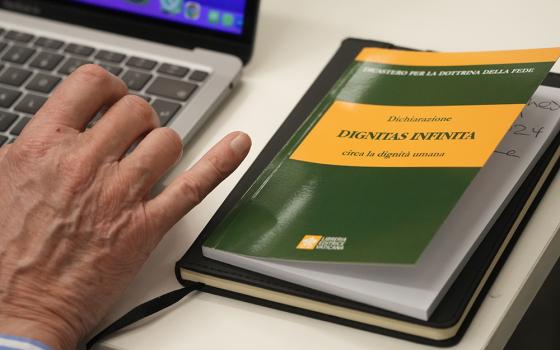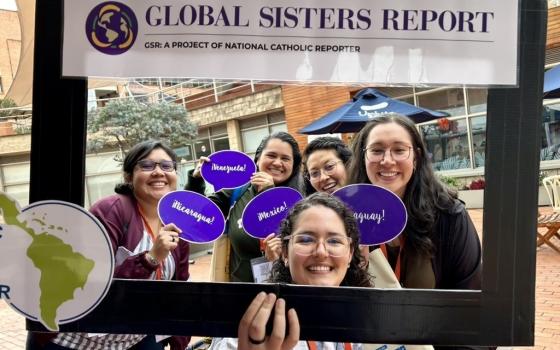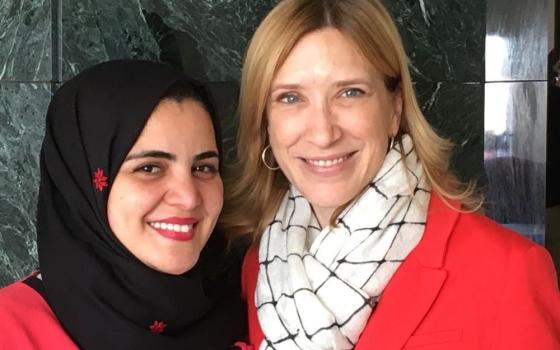
Protesters stand behind a burning barricade during protests over steep fuel price hikes Jan. 15 in Harare, Zimbabwe. (CNS/Reuters/Philimon Bulawayo)
Catholic and other Christian church leaders in Zimbabwe are pressing for dialogue between President Emmerson Mnangagwa and opposition leader Nelson Chamisa. The goal is to help end the country's political and economic crisis worsened by deadly protests over a fuel price hike in major urban areas.
Mnangagwa was declared the winner of the July 30 presidential elections, but Chamisa and his Movement for Democratic Change (MDC) party insist that the Zimbabwean leader manipulated results of the poll and have refused to acknowledge his presidency. Mnangagwa took power Nov. 24, 2017. The disagreement has resulted in a political stand-off that in turn has heavily impacted the economic situation.
The Zimbabwean economy has taken another nose dive as a result of protests over a massive fuel price hike announced by Mnangagwa on Jan. 12. Two days later, deadly protests engulfed the country with 12 lives lost — according to the Zimbabwe Human Rights NGO Forum — and property destroyed in addition to the looting of shops and other outlets.
Well known Zimbabwe Christian cleric and activist, Evan Mawarire, has been arrested and charged with subversion after circulating images through social media calling for people to demonstrate against the government. The High Court was set to give a ruling on his bail application on Jan. 30.
The Zimbabwe Catholic Bishops' Conference has intensified calls for dialogue to end the crisis. Several other Christian leaders have also criticized the government of Mnangagwa for heavy handedness of security forces in dealing with protestors.
"We thank the many Zimbabweans who continue to pray ceaselessly for our country. A new Zimbabwean politic needs to be more collaborative, inclusive and based not on one or two leaders, however effective and charismatic," the Zimbabwe Catholic Bishops' Conference said in a pastoral letter dated Jan. 17.
Advertisement
On Jan. 25, the Zimbabwe Catholic Bishop Council for State Churches as well as the Zimbabwe Catholic Bishops' Conference had a meeting with vice president, retired Gen. Constantino Chiwenga, and Defense Minister Oppah Muchinguri Kashiri in Harare.
"He [Chiwenga] wanted to brief [bishops] on the current situation," Fr. Frederick Chiromba, the secretary general of the Zimbabwe Catholic bishops' conference, told journalists after the meeting. "The bishops also responded and asked for clarifications in some areas. The main outcome is that [the] government is keeping an open door for the church so that the church can go to [the] government and ask for information and other issues.
"It was simply to get an understanding of the current situation and what we have to do as a nation to bring national cohesion," he said.
The Zimbabwean leaders are under growing pressure to sit down and dialogue on a way forward. The country is still counting losses and damages from the protests, which prompted Mnangagwa to call off a trip to the World Economic Forum held Jan. 22-25 in Davos, Switzerland.
Chamisa told NCR Jan. 24 that he was agreeable to dialoguing with Mnangagwa to help craft solutions.
"Dialogue is key, and we are very open to dialogue," he said.
On his return to Zimbabwe from visits to Russia, Belarus, Kazakhstan and Azerbaijan on Jan. 21, Mnangagwa appeared to soften to the growing calls for dialogue. He said on Twitter that Zimbabwe's economy had to be a key focus for all.
"I invite leaders of all political parties as well as religious and civil leaders to set aside our differences and come together, Mnangagwa tweeted. "What unites us is stronger than what could ever divide us. Let's begin a national dialogue. Let's put the economy first. Let's put the people first."
After disputed elections in 2009, Zimbabwe's former ruler, Robert Mugabe, joined hands with former opposition leader, Morgan Tsvangirai, helping stabilize the economy.
The Evangelical Fellowship of Zimbabwe, the umbrella body for Pentecostal churches in the country, said Jan. 17, "Our people are now living in fear of violence, fear of the unavailability and unaffordability of basic goods and services. There is a dark cloud of despair and helplessness over the nation." The protest — dubbed as #Shutdown by the Zimbabwe Congress of Trade Unions to shutdown economic activity — has also trended on social media platforms.
The Pentecostal pastors highlighted that many were struggling to "feed themselves," a situation underscored by the Famine Early Warning System Network, which said in a January 2019 report that "recent fuel price increases of about 150 percent will likely trigger significant price increases for all basic commodities, including food. As a result, poor households will likely struggle to access market foods."
The situation may lead to the rise of demand for relief aid from agencies such as Catholic Relief Services and the World Food Program.
Shingi Munyeza, a businessman and former senior pastor at the charismatic church Faith Ministries, has reminded Mnangagwa that he has to lead Zimbabwe on a path of prosperity and peace after he canceled his trip to Davos to come back home and quell public anger over the fuel price hikes. He was supposed to proceed to Davos after the bilateral visits to Russia and the three Eurasian countries.
"Welcome back to a wounded nation. At the prayer breakfast [August 2018], you agreed to be like King David. The path we have taken is that of King Saul. Take us back to what you promised," said Munyeza on Twitter.

Young people walk past a gas station closed after protests over steep fuel price hikes Jan. 15 in Harare, Zimbabwe. (CNS/Reuters/Philimon Bulawayo)
The Evangelical Fellowship has in a statement urged "Governing Authorities to URGENTLY convene a Round-table Dialogue Platform with ALL CONCERNED players, actors and citizen representative groups to discuss the root causes of the unrest and the way forward that is inclusive and sustainable in the immediate to midterm."
Catholic bishops have been more direct, saying:
We call upon Government and the Opposition to put their differences aside and work together to free Zimbabwe from economic shackles and international ostracisation. …We hasten to say a precedent for working together between Government and Opposition was set when the Government of National Unity (GNU) was formed under similarly difficult circumstances in 2009 and Zimbabwe's economy and prospects were positively revived and only began to regress yet again from the time the GNU expired in 2013.
The Zimbabwe Electoral Support Network also noted on Jan. 25 that it was important for Zimbabwean political leaders to open "an inclusive national dialogue to find lasting solutions to the challenges" bedeviling the country.
A Commission of Inquiry into a wave of violence that rocked Harare on Aug. 1 certified its findings Dec. 1, 2018. The commission was led by led by former South Africa President Kgalema Motlanthe and called for "nation building and reconciliation including an initiative for multi-party dialogue and cooperation" to defuse tensions and political polarization.
Government projections show that Zimbabwe's economy grew by 4 percent in 2018, but finance minister Mthuli Ncube expects this growth to slow down to 3.1 percent this year.
The protest action, initially started as a strike by the Zimbabwe Congress of Trade Unions and other workers organizations, disturbed economic activity in Zimbabwe and had an impact on companies in retail, banking, manufacturing and industry, especially in the two big cities of Harare and Bulawayo.
Government workers have also called for a demonstration over a deadlock with the government in demands for a pay increase. Zimbabwe is pushing an austerity program to reform the economy through tax increases and curbing public expenditure.
Government officials say the austerity measures to reform Zimbabwe will hurt everyone in the country but are necessary if the economy is to turn the corner.
[Tawanda Karombo is a business and financial technology journalist based in Harare, Zimbabwe, with more than 10 years of experience covering sub-Saharan Africa.]











